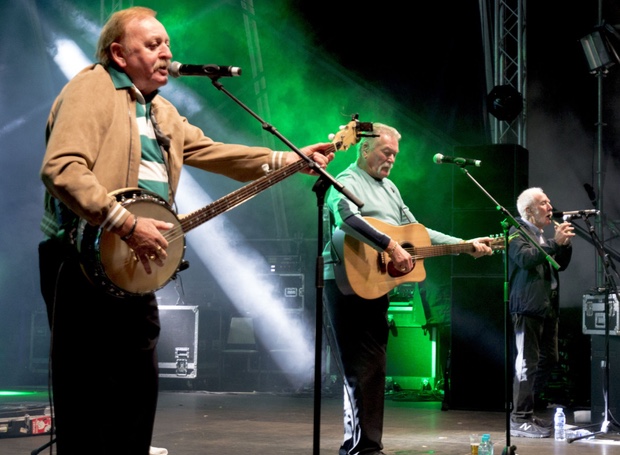
Saoradh has begun a campaign to defend and support the singing of Irish rebel songs and to end their equation with sectarianism by an anti-Republican lobby. An opinion piece by Paul Dunphy.
Saoradh, like most Irish people, are proud of the great ballad tradition in this country, and value how important songs, music, and other art forms have been in the wider struggle for national liberation. All oppressed and occupied peoples have cultural expressions that are born out of resistance and defiance to injustice and discrimination. The theme of the Irish rebel song celebrates those people, or the acts of brave men and women who resisted or continue to resist imperialism here and abroad.
Irish music and song are renowned worldwide, and it is understood and respected as an art form that endured and continues to endure centuries of oppression.
Tourists, when they are visiting, seek this out and enjoy the music, knowing that these songs are non-threatening, non-sectarian or non-supremacist, but are part of a ballad culture documenting a specific aspect of Irish history and society.
Censorship and seonínism is not new in this country, but the Irish and British establishment have taken this to another level this year between fawning over monarchy and now attacking a group of women celebrating a football victory. The anti-Republican lobby in this country seethe when they see that a spirit of defiance and an awareness exists in society and that ordinary people can see and express plainly the wrongs of partition and the effects of imperialism here.
Even on occasions when there may be no thought-out, or party-political motivation, behind these expressions, the paranoia of the British and 26 County states makes them act to either shut it down or denigrate those involved. They try their best to set their agendas in every realm of life; but on occasions, people’s frustrations bubble over and it is expressed in a wide range of formats from bombarding the charts with rebel songs, banners, slogans and chants at matches. We think the establishment have overstepped the mark even in their standards, and are provoking a population that is already at the end of their tether. They have misjudged people’s innate sense of right and wrong.
Let’s be clear; the establishment here and in Britain don’t just hate Republican songs — they hate the ideology of Republicanism, as they know it shows up the failures of the status quo. They have their cheerleaders of imperialism and capitalism who try to equate songs of the oppressed with hate speech. In the dangerous anti-Republican and sectarian dichotomous framing of the Belfast Agreement, and the language that stems from it, one side is set up to be as bad as the other i.e. the identity-focused approach which has diverted some former Republicans from the basic tenets of Republicanism, and which now sees the anti-colonial struggle here been portrayed as an internal squabble with those of differing identities.
Singing an anti-monarchy chant is put on the same level as some other group singing about killing Catholics and glorifying the Irish Holocaust known as the Famine. On a wider level it is the same non-Republican quagmire which sees funding for Irish language education and services in the 6 counties being ‘balanced up’ by funding bonfires, marches and hatefests where effigies and flags are burned. Only a 32 County Socialist Republic can be a remedy for these false dichotomies.
The sport world is a particular contested space in this debate. How are people to believe that politics should be kept out of sport? It is okay if the dominant hegemony have their say at sporting events by way of corporate sponsorship or by promotion of imperialist symbols like the poppy; however, there is no place for dissenting voices, it seems. Ireland is at the edge of a dangerous precipice. Anti-monarchy, Republican and socialist views are legitimate political positions, even if you don’t agree with them. They can or should never be equated with discriminatory opinions.
Our minds are drawn to the warning given by Malcom X: “If you’re not careful the newspaper will have you hating the people who are oppressed and loving the people who are doing the oppressing”.
Speaking with some of our members and supporters in the football scene they reminded us of the hypocrisy of condemning rebel songs while Derry born player James Mc Clean is subjected to the most horrendous sectarian abuse week in week out while playing in England. It is understood there has been progress on anti-racism in some circles but that the anti-Irish racism especially in England and Scotland seems to be acceptable by the media and the establishment.
Saoradh salutes the Irish public and especially sport fans who see through this façade for what it is. We call on people to contact the FAI and ask them to retract their apology for Irish people singing an Irish rebel song. Furthermore, we ask them to explicitly state that in future any Irish ballads sung at matches here or by Irish fans abroad will not be allowed to be equated with sectarianism or any other discriminatory act.
We also call on our ‘national’ broadcaster to reflect peoples love of Irish rebel ballads on their airwaves and screens.
Please tag both organisations on social media with your favourite rebel song and #letthepeoplesing. Email media@fai.ie and info@rte.ie
![[Irish Republican News]](https://republican-news.org/graphics/title_gifs/rn.gif)
![[Irish Republican News]](https://republican-news.org/graphics/title_gifs/harp.gif)

